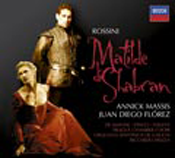Such. opera semiserie generally have elements of
both comedy and pathos. Matilde di Shabran, is unusual in that the pathos is mixed with some
dramatic incidents, especially in Act II, but it also has quite a bit of buffoonery. It turned out to
be the last light opera he wrote for Italy, although he did write two other such operas (Il viaggio a
Rheims and Le Comte Ory) for France a few years later.
The libretto by Giacomo Ferretti was originally very long and complicated, and Rossini soon
realized that he could not finish it in time. He turned to his friend, the composer Giovanni
Pacini, for help, and Pacini composed something like six numbers. The version given in Rome
also included some self-borrowings from earlier operas. Most of these were removed when the
work was given in Naples on Jan.21, 1822. But one duet by Pacini apparently remained. This is
the cabaletta to the duet between Matilde and Aliprando in Act I (track19—Ah di veder gia
parmi), which Pacini later used in his opera Il Corsaro (Rome, 1831), where it was used as the
stretta to a terzetto. This terzetto was recorded in its entirety by Opera Rara as part of their CD
“Paventa insano”, which consists of excerpts from unusual Mercadante and Pacini works.
After Naples, where it was performed as Bellezza e cuor di ferro, Matilde was given all over
Europe under one of its three titles (the third being Corradino). Outside Europe, it was produced
in Brazil, Algeria, Mexico, and the U.S. (NYC on Feb. 10, 1834). It continued to be given
regularly until around 1850. Florence, however, heard it as late as 1892, after which it
disappeared for over 80 years. It’s first post-World War II revival was in Genoa in 1974, when
the original 1821 version with Pacini’s additions was given. It vanished again, only to be heard
in its revised version in Pesaro in 1996. Bruce Ford was originally scheduled to sing the tenor
role, but withdrew, and was replaced by Juan Diego Florez, making an auspicious Italian debut. It
was later given in Bad Wildbad, and then for a second time in Pesaro in 2004 with Florez again
singing Corradino and Annick Massis as Matilde . It is this performance that is presented by
Decca Classics.
The plot has some unusual aspects, featuring a different type of hero, Corradino, who is a
combination of petty tyrant and mysoginist. Corradino starts out hating just about everybody,
especially women and poets, but winds up getting the girl in the end. She is a bit of a spitfire,
with a ready answer for everything. In the finale of Act I, she charms Corradino out of everything
except his pants. Other characters include Isidoro, a wacky poet, Aliprando, the castle physician,
and Edoardo, the son of Raimondo who owns a neighboring castle and is on bad terms with
Corradin, as well as the Contessa d’Arco, who has designs on Corradino herself. The Contessa
manages to throw suspicion on our heroine in Act II by claiming that she had freed Edoardo and
producing a forged letter. Corradino believes the Countess, sentences Matilde to death by being
thrown off a cliff into the raging torrent below, and orders Isidoro to do the dirty deed. Isidoro
soon returns to announce that Matilde is dead, after which Edoardo relates that his jailer had been
bribed by the Countess to loosen his bonds. Corradino is horrified at the thought of having put to
death an innocent woman, when, surprise of surprises, she turns up, very much alive, and all ends
well.
The libretto of the revised version has relatively few arias and duets, but an unusually high
number of ensembles. Thus, there are four major ensembles: a quartet for male voices, a quintet,
a sextet, and a lengthy finale to the second act. Even the “love duet” for Matilde and Corradino,
which is a part of the first act finale, becomes a quartet since two of the other characters are
hiding behind some columns, and comment on the action. The hero and heroine have only one
aria between them, that being Matilde’s rondo finale. On the other hand, Eduardo has two arias
(one in each act), Isidoro has one and Aliprando has an extended solo, with the participation of
the chorus in the introduction. Corradino did have an aria in the Rome version, but that was
removed for Naples since it was a self-borrowing from another Rossini opera.
Both of the principal artists should be fairly familiar to collectors of 19th century operas. Annick
Massis has recorded La dame blanche for EMI, several works for Opera Rara, including
Meyerbeer’s Margherita d’Anjou, and participated in the previously mentioned CD of
Mercadante and Pacini rarities. Juan Diego Florez is the leading exponent of Rossini’s light roles
of the day, having also recorded Le Comte Ory and a DVD of the Barber of Seville, as well as
several aria recitals. He is regarded by some as the finest tenore leggero of the recorded era, and
is gifted with a brilliant top and great ability with coloratura. I am also very much impressed by
the basso cantante Marco Vinco, and predict a bright future for him. Other fine relatively new
singers in the recording include the mezzo Hadar Halevy who sings Edoardo and the buffo Bruno
de Simone, the Isidoro of the recording.
I enjoyed this opera very much, and can recommend it to fans of Rossini and/or bel canto without
hesitation.
Tom Kaufman © 2007
